9 Tips To Gardening Safely When You’re A Senior

Gardening is a great outdoor activity for people of all ages, especially seniors. Not only does it have lots of benefits for your physical health, it’s also great at improving your mental health.
Flexing your green thumb and gardening regularly can not only maintain flexibility and mobility but it can also stave off physical conditions like osteoporosis and relieve mental strains like stress and depression, plus it can reward you with some lovely home-grown fruits and vegetables to eat!
Table of Contents
- 9 Tips For Safe & Pain-Free Gardening As You’re Getting Older
- 1. Keeping yourself covered protects you from UV rays & pesky pests
- 2. Be prepared to deal with potential injuries by keeping to hand a first aid kit
- 3. Recognize and accept your limits
- 4. Make your garden more accessible
- 5. Clear away hazards before they become a potential risk
- 6. Stay hydrated or risk injury due to dehydration
- 7. Use the right tools and equipment – there are specialized tools for seniors & pain sufferers
- 8. Have a plan for dealing with uneven ground
- 9. Get the family involved
9 Tips For Safe & Pain-Free Gardening As You’re Getting Older
Though it may seem like quite an easy job, there’s still a fair bit of physical activity involved when you tend to a garden, which is why it’s important for seniors to take a few extra precautions when gardening.
1. Keeping yourself covered protects you from UV rays & pesky pests
A good tip for gardeners of all ages is to always cover yourself up. While you are gardening you risk exposing yourself to all sorts of things that can be harmful to your body.
Wear a hat or use sunscreen to protect yourself against potential skin damage from the sun’s powerful UV rays and spray some insect repellent to deter pesky insects. 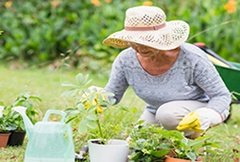
Gloves are always recommended so your hands don’t come into contact with any harmful chemicals or contaminants in the soil, such as bacteria, fungus, pesticides and fungicides. It also protects you against thorn cuts and nasty abrasions to the skin.
If you don’t wear gloves, even a tiny cut could lead to an infection that can turn nasty very quickly.
It’s also a good idea to wear a long-sleeved top and trousers to reduce the risk of anything harming your skin on other areas of your body.
2. Be prepared to deal with potential injuries by keeping to hand a first aid kit
Though you can reduce the risk of getting cuts, bruises and insect bites by covering up, should you get any of these, it’s strongly recommended that you treat the affected area as soon as possible.
Leave injuries untreated, no matter how small or insignificant they may seem, and as a senior they could become more problematic for you as they could become infected.
It’s a good idea to have a first aid kit of some sort or some basic medical supplies close by when you’re out gardening.
3. Recognize and accept your limits
It goes without saying that as you get older, it becomes more challenging to partake in certain physical activities.
Unfortunately, what you were easily capable of doing in your 20s and 30s, might not be so easy for you in your 60s and 70s.
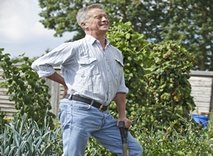 However, this doesn’t have to be a major hindrance to you if you are willing to take proper precautions.
However, this doesn’t have to be a major hindrance to you if you are willing to take proper precautions.
As certain aspects of gardening can be quite strenuous physically, especially if you’re doing lots of digging and planting, it’s important that you know what your limits are so that you don’t end up pushing yourself too hard.
It may be disheartening to think that there are certain things you can’t do, but aging and its physical side-effects are a reality for all of us, and so it is always best to focus on the things you can do and take pleasure from those things. Don’t be afraid to ask for help from a younger family member or friend.
If you don’t respect your limits, you could end up doing something that may have an adverse effect on your health and/or safety and end your gardening activities for the long-term. Short-term impatience could lead to long-term suffering. Always be careful.
4. Make your garden more accessible
It’s recommended that seniors make adjustments to their garden and yard environment so that it’s more accessible and safer for them.
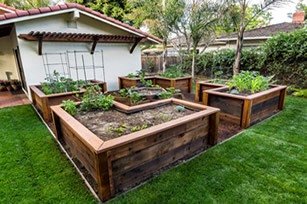 Keeping most vegetation and plants at a higher level, such as using raised beds, is a good way of doing this.
Keeping most vegetation and plants at a higher level, such as using raised beds, is a good way of doing this.
Instead of having gardening beds down on the floor, use raised beds or use vertical planting so you don’t have to do as much bending and stooping down.
It’s also worth thinking about the plants that you have in your garden.
Some plants might need watering more frequently than others and this could be a problem if the daily watering plants is something you struggle doing – it’s always best to have a garden full of plants that you’re physically capable of maintaining.
5. Clear away hazards before they become a potential risk
Make sure both your garden, and any walkways leading to it, are free from hazards or any obstacles that you might trip up on.
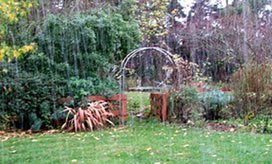 Have a slow walk around your garden, looking for things like plant roots, rocks, bits of uneven ground, loose steps etc., or anything you might easily miss and end up tripping over when focused on your garden activities.
Have a slow walk around your garden, looking for things like plant roots, rocks, bits of uneven ground, loose steps etc., or anything you might easily miss and end up tripping over when focused on your garden activities.
Also, take extra care when walking around your garden especially if it’s been raining and the ground is wet.
It might be a good idea to invest in cheap non-slip grips for your shoes so you can wander around without the risk of slipping.
If you need help spotting and clearing away hazards, ask a friend or family member to walk around your garden with you; they might be able to spot things you miss.
6. Stay hydrated or risk injury due to dehydration
We’ve talked before about keeping yourself covered when it’s sunny to avoid skin damage from the sun’s UV rays.
 Additionally, when the weather’s nice, it’s also important that you drink plenty of fluids and keep yourself well hydrated.
Additionally, when the weather’s nice, it’s also important that you drink plenty of fluids and keep yourself well hydrated.
If you don’t get enough fluids, especially if you’re spending a lot of time outdoors in warm weather, it can have serious side-effects, such as dizziness, fever, low blood pressure, lethargy and can even lead to seizures.
Seniors are particularly susceptible to dehydration, so it’s very important for older gardeners to stay hydrated at all times, especially when gardening in warm weather.
We are all capable of ignoring the signs of thirst, as it’s something we tend to do on a daily basis, but as a senior it is important you recognize when your body is sending you signals that it needs water and giving it what it wants immediately.
7. Use the right tools and equipment – there are specialized tools for seniors & pain sufferers
Seniors who are less physically capable than young people, of fully partaking in strenuous activities, should make sure they’re using the right sorts of tools and equipment when gardening.
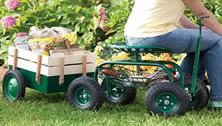 For example, they shouldn’t really be using potentially dangerous power tools if they have limited mobility and can’t hold the tools properly.
For example, they shouldn’t really be using potentially dangerous power tools if they have limited mobility and can’t hold the tools properly.
But as well as avoiding certain tools and potentially dangerous equipment there is also equipment that has been designed especially for seniors who love their gardens.
There are lots of gardening tools that have been specially designed for use by seniors and people with limited mobility. Check out our article 10 Gardening Tools For Bad Backs, Seniors & Weak Hands.
Using these tools will not only make gardening easier and more convenient for seniors, but it can also make it less dangerous and extend the length of time you get to spend doing the things you love in your garden.
8. Have a plan for dealing with uneven ground
Not all gardens are flat. If yours is completely flat, you should have no problems getting around the yard.
If, on the other hand, there’s uneven ground in your garden, you can use a cane or a walking stick to help yourself get around when performing gardening tasks.
I’ve seen people use rakes and hoes for the same purpose – which is a great way of making your garden tools work for you especially, if like me, you don’t always like to broadcast your limitations by using standard “help tools” like a walking stick.
Should you fall over, having a cane or walking stick (or similar) within reach should make it a lot easier for you to get back up on your feet again.
Additionally, just walking around on uneven ground can be made much easier with the aid of a walking stick.
Even healthy young people use walking sticks when hiking for the same reasons as do shepherds, so it isn’t something you should be hesitant about using.
9. Get the family involved
Don’t hesitate to get someone else in to help you if there’s part of your garden, such as a steep slope or bank, that you can’t safely access.
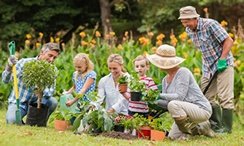 In fact, you can even make it a family affair. There is nothing better than getting the grandkids involved and this can lead to some real quality time for you and a lifetime of memories for them.
In fact, you can even make it a family affair. There is nothing better than getting the grandkids involved and this can lead to some real quality time for you and a lifetime of memories for them.
Gardening is a fantastic hobby to have and it can help to keep anyone healthy, flexible, mobile and fit regardless of their age.
However, it’s important for seniors to garden safely so that they can continue to enjoy all the wonderful benefits that their gardens have to offer, both physical and mental, for years to come.
Thanks for reading! I'm Michael — houseplant fanatic and your Pinterest plant guide.
Follow me on Pinterest for fresh updates 🌿



